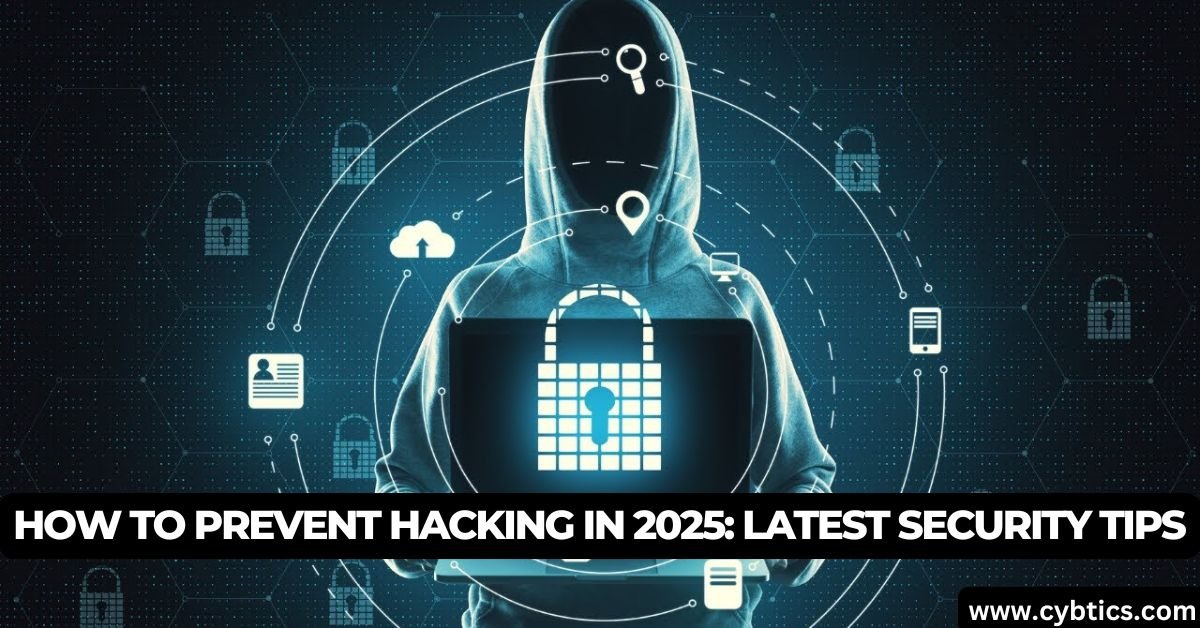In 2025, cyber threats have become more sophisticated, targeting individuals and organizations alike. Protecting yourself from these attacks is essential to safeguard personal information and maintain digital trust. Implementing effective security measures can significantly reduce the risk of falling victim to hackers.
By adopting strong passwords, enabling multi-factor authentication, and staying vigilant against phishing attempts, you can enhance your online security. Regularly updating software and using reputable antivirus programs further fortify your defenses. Curious about the latest strategies to stay ahead of cybercriminals? Read on to discover how to protect yourself in the digital age.
Hacking definition
Hacking is the act of breaking into computer systems without permission. It’s often done to steal information, cause damage, or simply prove it can be done. Hackers use advanced techniques to bypass security measures. Not all hacking is bad some hackers help companies improve security. Want to learn how they do it and why? Keep reading to find out.
How does hacking work?
Hacking works by finding and exploiting weaknesses in computer systems. Hackers use various methods to gain unauthorized access.
- Phishing: Trick users into revealing personal information through fake emails or websites.
- Malware: Infect devices to steal data or take control remotely.
- Brute Force Attacks: Guess passwords using automated tools.
- Exploiting Vulnerabilities: Take advantage of software flaws or outdated systems.
- Man-in-the-Middle Attacks: Intercept communication between two parties to steal information.
10 ways to prevent hacking

Protecting yourself from hacking is essential in today’s digital landscape. Here are ten effective strategies to enhance your cybersecurity:
Use Strong, Unique Passwords
Creating robust passwords is your first line of defense against unauthorized access. Ensure each password is at least 12 characters long, incorporating a mix of uppercase and lowercase letters, numbers, and special symbols. Avoid using easily guessable information like birthdays or common words. Utilizing a reputable password manager can help generate and store complex passwords securely. Regularly updating your passwords further strengthens your accounts’ security.
Enable Multi-Factor Authentication (MFA)
MFA adds an extra layer of security by requiring multiple forms of verification to access your accounts. This could include a combination of passwords, biometric data, or one-time codes sent to your device. Implementing MFA significantly reduces the risk of unauthorized access, even if your password is compromised. Many services offer MFA options; enabling them enhances your overall security posture.
Keep Software and Systems Updated
Regularly updating your operating systems, applications, and security software is crucial. Developers frequently release updates that patch security vulnerabilities. Enabling automatic updates ensures you receive these patches promptly, reducing the risk of exploitation by hackers. Outdated software can serve as an open door for cybercriminals, making timely updates a vital practice.
Install and Maintain Antivirus Software
Antivirus programs detect and neutralize malicious software before it can cause harm. Ensure you have reputable antivirus software installed on all devices and keep it updated to recognize the latest threats. Regular system scans can identify and remove potential malware, safeguarding your data and personal information. Combining antivirus software with other security measures creates a comprehensive defense against cyber attacks.
Be Cautious with Public Wi-Fi
Public Wi-Fi networks are often unsecured, making them prime targets for hackers to intercept data. Avoid accessing sensitive information, such as online banking or personal accounts, over public Wi-Fi. If necessary, use a Virtual Private Network (VPN) to encrypt your connection, adding a layer of security when using public networks. Disabling automatic connections to open Wi-Fi networks can also prevent unintentional exposure.
Regularly Back Up Your Data
Consistently backing up important data ensures you can recover information in case of a cyber attack or system failure. Utilize external hard drives or secure cloud services for backups. Regular backups minimize the impact of ransomware attacks, where access to your data could be restricted until a ransom is paid. Having recent backups allows you to restore your system without succumbing to such demands.
Educate Yourself and Your Employees
Human error is a significant factor in many security breaches. Regular training on recognizing phishing attempts, avoiding suspicious downloads, and adhering to security protocols can prevent many attacks. Encourage a culture of security awareness, where individuals feel responsible for protecting sensitive information. Staying informed about the latest cyber threats empowers you to take proactive measures against potential attacks.
Use Firewalls to Protect Your Network
Firewalls act as barriers between your trusted internal network and untrusted external networks. They monitor and control incoming and outgoing network traffic based on predetermined security rules. Implementing both hardware and software firewalls adds layers of protection, making unauthorized access more difficult for hackers. Regularly updating firewall settings ensures they effectively counter emerging threats.
Secure Your Home Wi-Fi Network
Change default passwords on your router to strong, unique ones. Enable WPA3 encryption if available, and consider hiding your network’s SSID to make it less visible to potential intruders. Regularly updating your router’s firmware can patch vulnerabilities and enhance security. Limiting the number of devices connected to your network reduces potential entry points for hackers.
Monitor Accounts for Suspicious Activity
Regularly reviewing your financial and online accounts can help detect unauthorized activities early. Set up alerts for unusual transactions or login attempts. Promptly addressing suspicious activities can prevent further unauthorized access and potential losses. Utilizing account monitoring services can provide additional oversight and peace of mind.
How to prevent hacking of phone
- Use Strong Passwords and Biometric Security
Set a strong password with a mix of letters, numbers, and symbols. Enable biometric security like fingerprint or facial recognition for extra protection. - Keep Software Updated
Always update your phone’s operating system and apps. Updates fix security flaws that hackers might exploit. - Avoid Public Wi-Fi
Public Wi-Fi networks are risky and can expose your data. Use a VPN to encrypt your connection if you must use public Wi-Fi. - Be Cautious with Downloads and Links
Only download apps from trusted sources like Google Play or the App Store. Avoid clicking on suspicious links in emails or messages. - Enable Two-Factor Authentication (2FA)
Activate 2FA on your important accounts. It adds an extra layer of security, making it harder for hackers to access your data.
How to prevent hacking in computer

Use Strong and Unique Passwords: Create strong passwords with a mix of letters, numbers, and symbols. Avoid using the same password for multiple accounts to reduce risk.
Keep Software and Operating System Updated: Regularly update your computer’s OS and software. Updates fix security vulnerabilities that hackers can exploit.
Install Reliable Antivirus and Firewall: Use trusted antivirus software to detect and remove malware. Enable your computer’s firewall to block unauthorized access.
Be Cautious with Emails and Links: Don’t open attachments or click on links from unknown senders. Phishing emails are a common way hackers steal personal information.
Back Up Your Data Regularly: Save copies of important files on external drives or cloud storage. This protects your data in case of a ransomware attack.
How to avoid getting hacked on social media
Protecting your social media accounts starts with strong security measures. Use complex passwords that combine letters, numbers, and symbols, and never reuse passwords across platforms. Enable two-factor authentication (2FA) for an extra layer of protection. This makes it harder for hackers to access your account even if they get your password.
Be cautious about what you share online. Avoid posting sensitive information like your location, phone number, or personal details. Hackers can use this information for phishing attacks or identity theft. Also, think twice before clicking on links in messages or posts, even if they seem to come from friends.
How to prevent hacking in business
Securing your business from hackers starts with strong cybersecurity practices. Use complex passwords and require employees to change them regularly. Implement two-factor authentication to add an extra layer of security. This helps protect sensitive business data even if passwords are compromised.
Keep all software and systems up to date. Cybercriminals often exploit outdated software with known security flaws. Train employees to recognize phishing emails and suspicious links. Regular security audits also help identify and fix potential vulnerabilities.
Frequently asked question
How to block hackers from my Android phone?
Keep your phone’s software updated and install apps only from trusted sources. Use strong passwords and enable two-factor authentication for extra security.
How is hacking prevented?
Hacking is prevented by using strong passwords, enabling two-factor authentication, and keeping software up to date. Regular security checks and avoiding suspicious links also help.
How can we keep safe from hackers?
Stay safe by using complex passwords and not sharing personal information online. Be cautious about clicking on unknown links or downloading attachments from untrusted sources.
What is the best protection from hackers?
The best protection includes using strong, unique passwords and enabling two-factor authentication. Regular software updates and reliable antivirus software also enhance security.
What are 3 things you can do to avoid being hacked?
Use strong passwords and change them regularly.
Enable two-factor authentication on all accounts.
Avoid clicking on suspicious links or downloading unknown attachments.
Summary
To prevent hacking, use strong, unique passwords and enable two-factor authentication. Keep your software and apps updated to fix security vulnerabilities. Avoid clicking on suspicious links or downloading unknown attachments. Install reliable antivirus software to detect and block threats. Always back up important data to protect it from cyberattacks.






